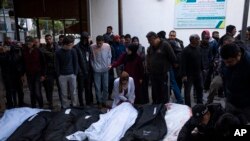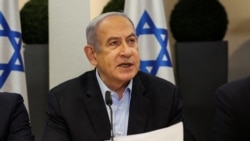Israeli airstrikes Monday hit the southern city of Rafah, killing at least 67 people according to local health officials in the area of the Gaza Strip where 1.4 million civilians have already fled to in order to escape the war.
Residents described heavy bombing, with the Israeli strikes hitting several houses and mosques.
The Israeli military said it struck “terror targets” in part of Rafah, and that the strikes coincided with a mission that rescued two Israeli hostages who were being held by Hamas militants.
Israeli Prime Minister Benjamin Netanyahu praised the operation, saying Israel “will not miss any opportunity” to bring home hostages held in Gaza.
“Only continued military pressure, until total victory, will bring the release of all our hostages,” Netanyahu said in a statement.
More than four months of war, and repeated Israeli evacuation orders have pushed Palestinian civilians farther and farther south, with many living in tent camps and overcrowded U.N. shelters in the Rafah area.
But with Rafah located at the southwestern edge of Gaza, along the Egyptian border, the shift in Israel’s focus of operations from northern Gaza to areas in the south has raised international concerns about where Palestinians can safely go.
Meinie Nicolai, director-general of medical aid group Doctors Without Borders, called Monday for Israel to halt its offensive in Rafah and for other countries to “take concrete action” to bring a sustained cease-fire.
“Nowhere in Gaza is safe, and repeated forced displacements have pushed people to Rafah, where they are trapped in a tiny patch of land and have no options,” Nicolai said in a statement.
U.S. President Joe Biden spoke to Netanyahu by phone Sunday and told him Israel shouldn’t go forward with a military operation in Rafah without “a credible and executable plan for ensuring the safety of and support for the more than one million people sheltering there,” a White House statement said.
Netanyahu on Sunday promised “safe passage” for tens of thousands of Palestinians out of Rafah ahead of a planned Israeli ground offensive against Hamas militants.
It was not clear, however, where the displaced Palestinians could go.
Netanyahu, in an interview broadcast Sunday on ABC’s “This Week” show, reiterated his intention to order Israeli troops to attack four Hamas battalions in Rafah, saying victory cannot be achieved over the militants in Gaza without clearing them out of the town on the Egyptian border.
When asked where the Palestinians — many already sheltering in makeshift tents — would go, Netanyahu said only that Israeli officials are "working out a detailed plan."
U.N. Secretary-General Antonio Guterres said there would be the risk of a "gigantic tragedy" if the Israel Defense Forces expand their offensive into Rafah.
“We would not support in any way forced displacement, which goes against international law,” Guterres’ spokesperson told reporters Friday about a potential evacuation of Rafah.
German Foreign Minister Annalena Baerbock wrote on social media platform X, "The people in Gaza cannot disappear into thin air," adding that an Israeli offensive on Rafah would be a "humanitarian catastrophe in the making."
Saudi Arabia's foreign ministry warned Saturday of "very serious repercussions of storming and targeting" Rafah and called for an urgent U.N. Security Council meeting. British Foreign Secretary David Cameron said he is "deeply concerned" about the prospective offensive.
"The priority must be an immediate pause in the fighting to get aid in and hostages out," he wrote on X.
An Israeli ground offensive into Rafah could have other repercussions as well.
Hamas-run Al-Aqsa television quoted a senior Hamas official as saying any Israeli ground offensive into Rafah would "blow up" negotiations for a halt in the fighting and the possible release of about 100 hostages held by the militants.
Hamas has been designated a terror group by the United States, Britain and the European Union. The war in Gaza started with the October Hamas attack that killed 1,200 people in Israel and led to the capture of 240 hostages, about 100 of whom were released in a weeklong cease-fire in November. Hamas health officials say Israel’s counteroffensive in Gaza has killed more than 28,300 people.
Egyptian officials have warned that any ground operation in Rafah or mass displacement across the border would undermine its 40-year-old peace treaty with Israel.
It is also the main humanitarian aid entry point to Gaza and intense fighting could further hamper relief efforts.
Egypt's foreign minister, Sameh Shoukry, warned that any Israeli ground offensive on Rafah would have “disastrous consequences,” claiming that Israel aims to eventually force the Palestinians out of their land.
The dire humanitarian situation has sparked Arab and U.N. concerns that Palestinians may eventually be driven over the border.
Egypt has sent about 40 tanks and armored personnel carriers to northeastern Sinai within the past two weeks as part of a series of measures to bolster security on its border with Gaza, two Egyptian security sources said.
Some information for this story came from The Associated Press, Agence France-Presse and Reuters.









